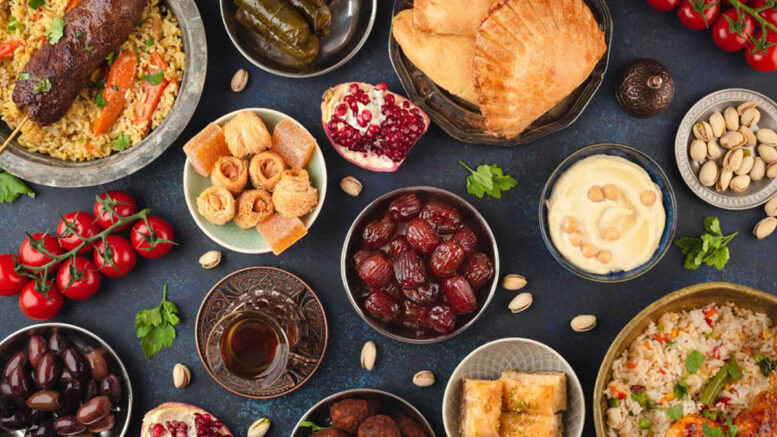Ramadan, the ninth month of the Islamic calendar, is a sacred period during which millions of Muslims worldwide observe fasting from dawn to sunset. While individuals managing diabetes and taking medication are not required to fast, some still choose to participate.
Fasting entails abstaining from food, drinks, and oral medications throughout the daylight hours, with the fast breaking at sunset (Iftar) and resuming at dawn (Suhoor). In Pakistan Summer season, fasting can extend beyond 13 hours.
With a limited window between Iftar and Suhoor for nourishment, making wise food choices is essential. Prioritizing nutrient-dense foods rich in vitamins, minerals, and hydration can help sustain energy levels and regulate blood sugar, ensuring a healthy and balanced approach to fasting during Ramadan.
1. Breaking off the fast
For centuries, dates have been a staple for breaking the fast, dating back to the time of Prophet Muhammad. They are packed with natural sugars that provide a quick energy boost and are rich in fiber. However, moderation is key—consuming too many dried fruits, especially after an extended fast, can lead to a spike in blood sugar levels. A portion typically consists of 2-3 dates, depending on their size. Pair them with plenty of fluids to stay hydrated and curb hunger until it’s time for the iftar meal.
2. Drink plenty of water!
Make sure to stay hydrated by consuming at least eight glasses of water between iftar and suhoor. If the weather has been particularly hot, you might need to increase your intake. Prioritize water or unsweetened drinks to maintain hydration. If you choose to have fruit juice or a smoothie, limit your portion to around 150ml. Additionally, try to minimize caffeinated beverages like coffee and tea, as they can contribute to dehydration.
3. Consume carbs with a low glycaemic index (GI)
Foods with a low glycemic index (GI) digest gradually, leading to slower increases in blood sugar levels. They help sustain energy throughout the day and keep you feeling full for longer. Examples of low-GI foods include…
- Porridge, oats, and all-bran
- Wholegrain breads
- Pasta and basmati rice.
- Legumes (such kidney beans, lentils, and chickpeas)
- Low-fat dairy items
4. Ensure that your Iftar meal is well-balanced
Use the healthy plate model as a simple guide for balanced meals:
- Fill half your plate with non-starchy vegetables or a fresh salad.
- Reserve a quarter for low-GI carbohydrates like whole grain pasta, basmati rice, legumes, or sweet potatoes.
- Use the remaining quarter for a lean protein source such as skinless poultry, fish, lean meat, eggs, or tofu.

The healthy plate model is a useful guide for building a well-balanced meal. Try to steer clear of greasy, heavy, or oversized portions, as they can slow digestion and contribute to spikes in blood sugar levels later on.
Iftar is often a joyful occasion, bringing family and friends together to break their fast. However, it’s essential to practice moderation. Regularly consuming deep-fried, rich, or sugary foods can lead to health concerns such as weight gain, elevated cholesterol, insulin resistance, and high blood glucose levels. Ramadan presents a great opportunity to adopt healthier eating habits that can benefit you long after the month ends.
Read Also: The Best Diabetes Treatment Plans for Ramadan
5. Eat Mindfully
After fasting for an extended period, it’s beneficial to break your fast slowly. Begin with hydrating fluids and nutrient-rich, low-fat foods to ease digestion. Take your time to enjoy each bite, especially during iftar. Allow your body to process the food before deciding if you need a second serving.
6. Nourishing Soups
Soups are a staple at iftar and an excellent way to replenish fluids and nutrients. Opt for wholesome recipes featuring lentils, legumes, vegetables, and lean proteins. These ingredients boost fiber intake and keep you hydrated, making soups a comforting and nutritious choice.
7. Choose Smart Snacks
It’s tempting to indulge after a long fast, but moderation is key. Limit processed, high-fat, and sugary treats, as your eating window is short, and your body needs essential nutrients. Instead, save indulgent foods for special occasions and opt for healthier alternatives like fresh fruit, unsalted nuts, low-fat yogurt, wholegrain crackers with low-fat cheese, or veggie sticks with hummus. These choices will keep you energized and nourished throughout Ramadan.
8. Supporting Digestive Health
Changes in eating patterns and reduced fluid intake during fasting can sometimes lead to constipation. To maintain healthy digestion, it’s essential to stay hydrated and incorporate fiber-rich foods into your diet. Whole grains, high-fiber cereals, bran, fruits, vegetables, beans, lentils, dried fruits, and nuts can all promote regular bowel movements. Pairing these with sufficient water intake and engaging in light physical activity, such as a short walk after iftar, can further support digestive health.
9. Optimizing Your Suhoor Meal
Suhoor, the pre-dawn meal, plays a crucial role in keeping you energized and hydrated throughout the fasting day. To prepare your body for the hours ahead, focus on hydrating with plenty of fluids during the evening and choosing moisture-rich foods like fruits, vegetables, yogurt, soups, and stews. These help sustain hydration levels for the day. Additionally, limiting salty foods and avoiding excess salt can prevent unnecessary thirst and dehydration.
10. Staying Active During Ramadan
Maintaining physical activity during Ramadan is beneficial for overall well-being. While high-intensity workouts are best avoided during fasting hours—especially in warm weather—engaging in moderate activities such as a post-iftar family walk can support blood sugar regulation, boost energy, and enhance overall health.
If you observe Ramadan and have diabetes, it’s important to consult your doctor or diabetes care team for guidance on managing your condition while fasting. Share any challenges you’ve faced during past fasts and how you handled them so they can provide personalized advice. They may recommend adjustments to your medication or treatment plan to help you fast safely and maintain stable blood sugar levels.


Be the first to comment on "Tips for eating healthily during Ramadan"